
Urge


















THE JOURNAL ON TORAH THOUGHT
| Please send letters and questions to: Comment@Mesora.org |
3 Mission
DISCUSSIONS Are we each unique?
4 Messiah
DISCUSSIONS Why is it 1 of the 13 Principles?
4 Astrophysicist Meets Morality
DISCUSSIONS
Wrong conclusions about God
5 Other Worlds
RABBI MOSHE BEN-CHAIM Arguments against the Multiverse
7 Urge to Give
RABBI REUVEN MANN Tabernacle, perfection and donating
9 Happiness
RABBI ELIE FEDER PHD Torah lessons from a mom’s parting words

Rubio pushes back against Mahmoud Khalil defenders: US will deport supporters of groups like Hamas who burn innocents alive, who rape and butcher babies.

RABBI MOSHE BEN-CHAIM
RABBI: One supports this view as this means he too is special: it is egoistical, self-serving, and thereby appealing and widely accepted. But Torah says otherwise: we are all to follow one singular system of 613 commands. Without prophecy directing a given person in a unique task, there is no support for this view that each person has a unique mission in life. We should not seek to make ourselves unique, that is antithetical to Torah’s direction to pursue God’s wisdom, not our own status. Focus on the self, accomplishment, and success does not bring happiness. Happiness is attained when one’s mind is engaged in God’s wisdom, looking external to oneself.

Talmud Sota 21b says Torah is attained only when one separates himself from all other involvements, even rendering him with little means, and when he also views himself as nothing. This means to succeed in Torah, one’s attention must not be diverted away from Torah, not to other pursuits, or to one’s plans for greatness. The self cannot be of any focus. If it is, one will fail at Torah which requires “all one’s drives, all one’s intellect, and all one’s intensity” (Deut 6:5). ■
RABBI: Why is the Messiah one of the 13 Principles, principles that teach some perfection about God? Rabbi Reuven Mann explained that man is the only creation operating in an imperfect form. Man is corrupt. This reflects poorly on a perfect God. However, in the messianic era, God will make a change and mankind will follow the proper life. In that era, all God’s creations will operate with perfection, reflecting God’s perfection in all His creations. Thereby, all 13 Principles teach God’s perfection.
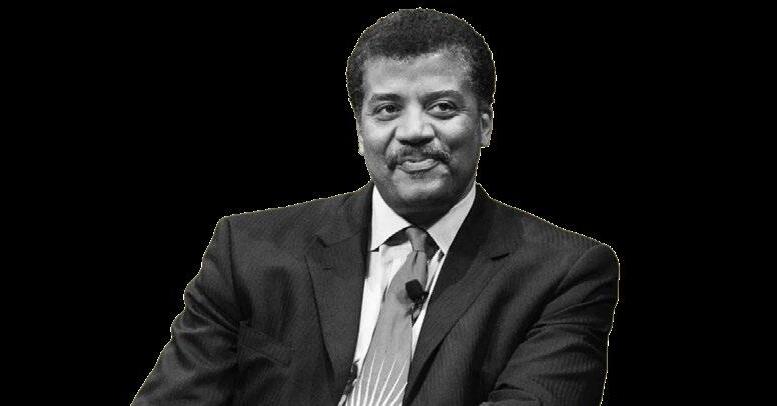
NEIL DEGRASSE TYSON: “Tsunamis killed 1/4 million in Indonesia and earthquakes killed 1/4 million in Haiti. Therefore God is either not all-good or not all-powerful.”
RABBI: Neil deGrasse Tyson operates with a principle that life is entitled to anyone under any condition. That’s his own flawed human assessment, not the true moral conclusion, determined only by the Creator of life. Tyson does not feel the Creator of life owns the right to maintain life only when His conditions are met.
It’s illogical to suggest the Creator can’t control His creations. By definition, the Creator controls all His creation’s existences, and granted it all its properties. Thus, the Creator can control all He creates. He is all-powerful. Neil deGrasse Tyson also questions God’s morality. Certainly, Tyson accepts historical accounts witnessed by masses, like Caesar, Alexander the Great, and all accounts in Bible, as Bible lists dates, locations, and numerous family names of the Children of Israel. Tyson is aware of the Egyptian Exodus where God saved the Jews through 10 plagues and the splitting of the Reed Sea. Thus, God is not lacking goodness to save whom He desires, and to punish their oppressors, like the Flood of Noah’s era. Instead, Tyson should seek to learn rules that determine when certain peoples fail to comply with their right to life, as the Egyptians failed. God created life with certain conditions, they are found in His Biblical laws. And our leaders like Moses, Kings David and Solomon, and more recently Maimonides elaborate on God’s rules of life. It behooves us to not criticize God before studying greater minds than ours, and learning why they didn’t not view tsunamis and earthquakes as questions on the Creator’s morality. ■





Sci·en·tist –
sīəntəst, noun:
“A person who is studying or has expert knowledge of one or more of the natural or physical sciences.”
“Study” refers to observation of reality. And “reality” has 2 parts: entities and their properties. If one makes claims that deviate from the observed world and suggests existences or natural laws without evidence or reason, he is not a scientist, but a fantasist. For he believes in imagination and not reality. His words are fabrications and lies. He may believe there is a bridge in front of him as he drives over a cli , but reality will soon expose his error when his car plummets into the ocean. If another person suggests trees can grow perfectly square apples made of glass, he too will be discounted as a fantasist as he suggest what has never been witnessed; he conflicts with science. He dismisses the observed world, and fantasizes.
Proponents of a “Multiverse” theory intend to eliminate the need for God. They do so by suggesting infinite universes existed, where all possibilities eventually play out, and our universe evolved by chance, perfectly suited for human life. Meaning, there is no need for God.
First of all, suggesting multiple universes came to be and vanished, or exist simultaneously, is without evidence. That’s not a scientific conclusion. Secondly, science supports a Big Bang. That means there is an exclusive single cause for matter. This precludes subsequent Big Bangs, as matter cannot be created once it already exists. Therefore, unlike the Multiverse theory, there is no basis to suggest matter will ever veer from its observable properties such as substance, form, location, weight, atomic composition and fine tuning.
Thirdly, this Multiverse theory is without reason, as assumed infinite possibilities do not demand “all” possible variations. For example, one can throw buckets of ink at a wall forever, and this will never create even a single page of Shakespeare. So too, infinite worlds can all be as chaotic as that dripping ink, with no habitable environment for life. This is a crucial step: infinite possibilities do not demand “all” possible variations. Additionally, Multiverse proponents contradict themselves, as they wish to apply randomness and chaos—our world’s laws—onto new universes. But according to them, new universes should have properties “other” than randomness, variation and chaos. Perhaps in an infinite string of universes, none have laws of random like ours, and each emerging universe exactly duplicates the previous one. Why should we apply our universe’s random properties to other universes? Think about what they’re saying: they say infinite universes should have variation or random versions. But thats “our” universe’s design! Multiverse fantasists applying “variation” to other universes, thereby say other universes mimic ours, which is against their Multiverse theory. Why can’t new universes be metaphysical with no physical substance, like a world of ideas and laws? Multiverse proponents who suggest variation of new universes—their first contradiction—should also entertain universes without substance. As they say the human spirit—a metaphysical entity—is a product of infinite universes, what demands the universe itself can’t be wholly metaphysical?
We reject this Multiverse theory in more ways. In their Multiverse theory, they fantasize that infinity is possible, while never observing infinity. Nothing observed presents the infinite: nothing is infinitely big, has infinite properties, there is no evidence of infinite space, there is no evidence of infinite time. Thus, the Multiverse is built on fantasy, making the Multiverse unreal. In their attempt to remove God, how do universes exists? From where came the first universe? If they hold like Plato and Aristotle that matter is eternal, with no beginning, nothing can exist of its own. There must be a cause for anything in existence, and the “eternal” world theory never traces back to any cause. Traveling back in time infinitely eliminates any “first cause.” Without a first cause, nothing else can exist, as nothing can create itself. ■

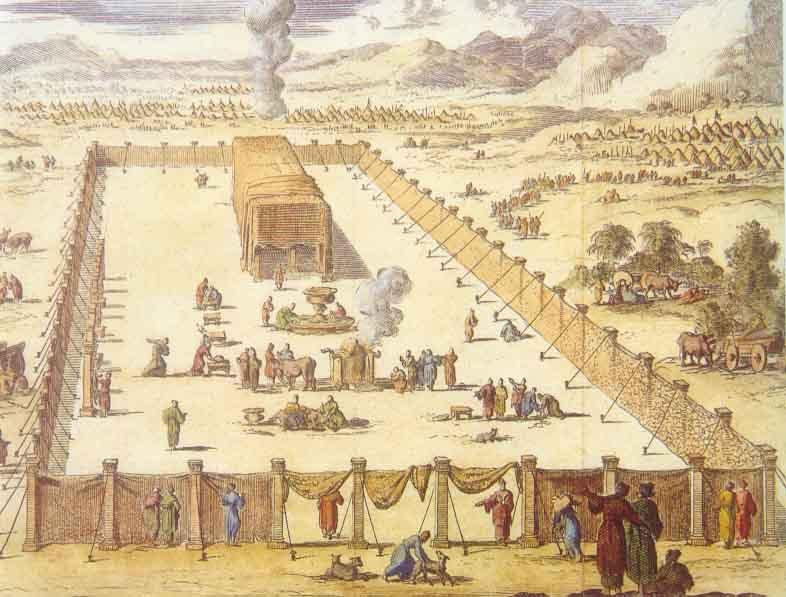
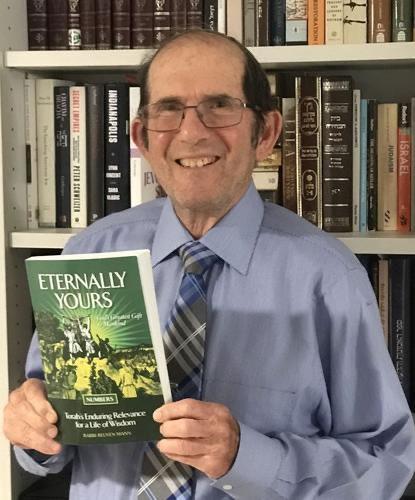
This week’s Parsha, VaYakheil, continues and concludes the description of how the components of the Mishkan (Tabernacle) were fashioned. As we have learned, there was no taxation for this purpose. Rather, the people were informed of the materials needed for the construction of the Sanctuary, its vessels, and the priestly garments. In addition to these very special materials, skilled craftsmen and craftswomen were required—individuals whom Hashem had endowed with wisdom and talent. They were invited to transform the raw materials into the intricately crafted vessels and garments designated for the Temple service. Moshe’s building campaign was extremely successful, as people gave with unbounded generosity. So much so that Moshe was informed that the people were bringing more than was necessary for the project. Upon hearing this, he sent out a message instructing everyone to stop donating. When was the last time anyone heard of a charitable cause exceeding its fundraising goals and asking donors to refrain from giving? Just asking.
What can we learn from this overwhelming eagerness to contribute—to the extent that the people literally had to be told,
co ns containing the remains of slain Jews—including babies subjected to cruel torture—are handed over to the Red Cross. While we must not show mercy to these villains, relocating them to other more suitable places would be an act of great kindness and a necessary step in uprooting terrorism from Gaza.]
However, despite man’s inhumanity, that is not the full story. Within this same being exists, alongside his evil inclination, a deep-seated ‘need’ to give and to do ‘noble’ deeds. While it is true that people have a strong desire to receive, the urge to give is equally compelling. Even thieves and criminals experience this desire—though what they “generously” give does not necessarily belong to them. This is what is known as the "Robin Hood" morality of stealing from the rich to give to the poor. This is a tactic that many politicians seem to have perfected. [It is important to note that Judaism lends no sanction to such misguided behavior. Stealing, even for a seemingly worthy cause, remains a crime, and one may not accept donations from tainted sources.]
Why is charitable giving such a compelling and fulfilling endeavor?
At a certain point, a person may come to realize that he is not, in the grand scheme of things, particularly significant. To live purely for oneself is a narrow and ultimately unsatisfying existence.
Man longs for a ‘purpose’ that grants meaning to his life. He cannot attain true happiness merely by securing
his bodily and material needs, for “it is not by bread alone that man exists” (Devarim 8:3). Without a greater purpose, he is likely to feel empty and depressed.
To counter this sense of meaninglessness, a person seeks to marry, build a family, contribute to the needs of his community, and help others. He may volunteer his time to mentor youth, especially those from underprivileged backgrounds. If he is able to positively impact another person’s life, he will acknowledge that this brings him the greatest joy.
Immediately prior to the Exodus, Bnei Yisrael (Children of Israel) were instructed to request gifts of silver, gold, and clothing from their Egyptian neighbors, who responded with great generosity and bountifulness. Not long after, the call went out for contributions toward the construction of the Mishkan. One might expect that these former slaves would hesitate to part with their newfound wealth. However, they already understood the great Jewish teaching that material possessions are not an end in themselves, but are best used to facilitate lofty spiritual ideals. And so, they gave with enthusiasm. It is also important to recognize that one’s giving should not be limited to others; a person has a responsibility to give to himself as well. To truly benefit others, one must cultivate his own moral and intellectual development. The more wisdom and understanding a person attains, the greater his capacity to positively influence others. In this way, the pursuit of knowledge and good deeds benefits both the individual and the world around him. May we merit to achieve this noble goal.
Shabbat Shalom. ■
Rabbi Reuven Mann has been a pulpit Rabbi and a teacher of Torah for over fifty years. He is currently the Dean of Masoret Institute of Judaic Studies for Women and resides in Arnona, Jerusalem.
Questions? Comments? Please reach out to Rabbi Mann on WhatsApp 050-709-2372 or by email at: rebmann21@aol.com or to Mitch Rosner on WhatsApp 054-426-3419 or by email at: mitchrosner@gmail.com



Part 2 of 5: Your Place
RABBI ELIE FEDER PHD
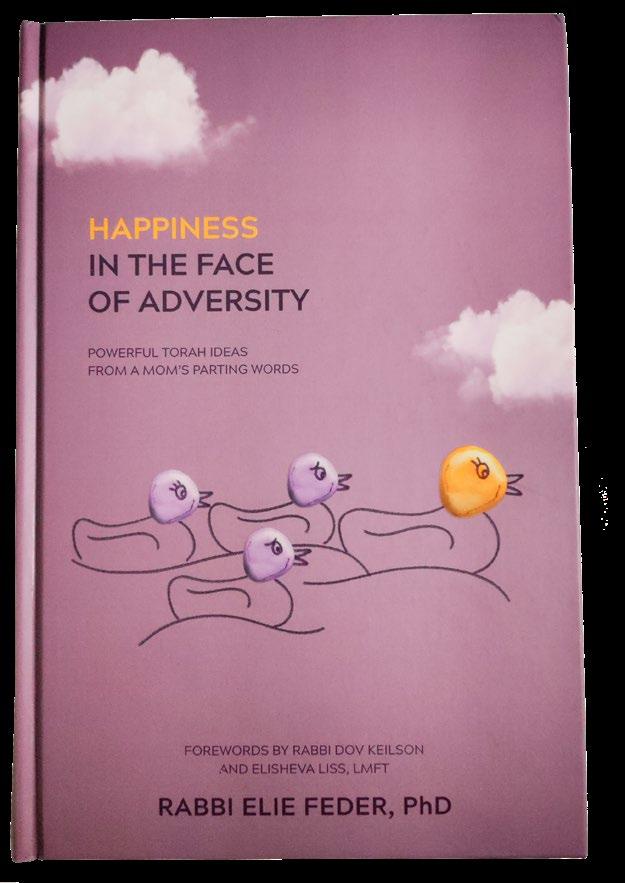
“I am awed by watching the miraculous order of God’s nature unfolding in my backyard — you can see throughout nature, a mother’s job is to give her child wings, teach them to fly, and watch them soar. Each year I watch the swans hatch ugly ducklings, teach them to hunt for food and — when strong enough — teach them to fly. Then they turn into beautiful swans and fly off to start their own lives (so it seems). Fortunately, children may leave the nest — but don’t always leave the neighborhood. And I have really had the zechus to watch you all soar.” — My mother’s letter
This is beautiful! I can’t read my mother’s introduction without appreciating its elegance. The imagery. The metaphors. The emotions. The turns of phrase. It’s even more beautiful if you’ve seen her backyard on the bay in real life. You can truly envision the scene she’s describing. I’ve seen it hundreds of times, but not like she did. To me, it was a beautiful scene. But to her, the beauty was only skin-deep. To her, it was a meaningful scene, a scene that spoke to her about God’s wonders, that reminded her of her small place in His big world.

https://amzn.to/4i8PkLg
My mother’s beautiful swan metaphor enables me to see myself differently. My siblings and I are the ugly ducklings she brought into the world. She raised us to be her beautiful swans — she gave us wings, taught us to fly, and watched us soar. I never knew she thought like this. While she didn’t explicitly speak this way, her letter rang true. She embodied its perspective every day of her short life.
While I can’t get enough of reading this paragraph, I can’t help but ask, “What does this have anything to do with happiness? Are the swans just her captivating introduction to her ‘Thoughts on Happiness,’ or do they somehow relate to the topic of her precious letter?” To answer this question, let’s first consider why some people are happy and others are not. As counterintuitive and random as it may seem, let’s start with Haman.
Haman’s Unhappiness
Haman had everything. He had great riches, he had many sons, he was the second-most powerful person in the world, everyone in the kingdom bowed to him, and he was even invited to a private party with the king and the queen — and then to a second party. What more could a man desire?
Despite it all, Haman confided to his family that it was all worthless to him. Every time he saw Mordechai the Jew just sitting at the king’s gate, refusing to even flinch for him, he felt that it was all worthless. Worthless? Doesn’t that sound extreme? Bothersome, yes. But worthless?
Just as we intuitively feel that extreme illness prevents happiness, we feel even more strongly that extreme success causes it. If so, how can it be that Haman’s extreme success meant nothing to his happiness? The answer is that while Haman had much, he wanted even more. Though he was a mere mortal, in his fantasy, he saw himself as immortal. Though he was a man, he imagined himself a god.
Of course, this wasn’t really true — he wasn’t actually a god. In reality, Haman was but a small part of God’s enormous universe. If so, you may ask, how could he have actually believed that the entire world revolved around him? The answer is that Haman’s extreme success confirmed his illusion of greatness. After all, everyone bowed before him. But there was only one problem: it was all one big illusion. And, because Haman knew this deep down, it only took one Mordechai to burst his bubble, to remind him that he was a mere mortal. Every time Haman saw Mordechai the Jew, he was reminded of his true place in God’s vast universe.

Now we can understand how seeing Mordechai could render all of Haman’s success worthless to him. Since the primary benefit of Haman’s success was to confirm his fantasy of greatness, undermining this fantasy rendered his success worthless. This explains why he needed to kill all the Jews. If only he could rid the world of Mordechai and his nation’s philosophy, he could continue living at the center of his imagined world — he could once again enjoy his success and the endless confirmation of his greatness.
Haman’s response to Mordechai teaches us that the greater we think we are, the more we need the world to conform to our erroneous beliefs. But it never really does. While we don’t suffer from Haman’s extreme megalomania and we don’t face Mordechai’s refusal to bow before us, we aren’t entirely removed from Haman’s issues. Each of us, on our own level, harbors fantasies — sometimes hidden — about our importance. And we all have our own versions of Mordechai in our lives. Maybe it’s our friends, enemies, or coworkers; maybe it’s illness, conflict, or financial struggles. One way or another, we have countless reminders of our small place in Hashem’s big universe, of the falsehood of our illusions of greatness. These reminders create significant obstacles to our happiness.
You may ask how we get around these challenges and attain happiness. Perhaps we can gain some insight from my mother’s letter.
Now I see why my mother started her letter on happiness with her unique perspective on her picturesque backyard. How did she view her nice house and her beautiful view? As a Haman-like confirmation of her importance in the world? Of course not! If we carefully review her letter, we will find the answer to this question and discover her first secret to happiness.
She didn’t view herself as special or more important than other people. On some level, she didn’t even see herself as elevated above swans. She identified herself — like the beautiful swans — as but one instance of a devoted mother whom Hashem masterfully programmed to teach her kids to soar. From this humble perspective, my mother made no assumptions and had no illusions of grandeur or expectations of Divine protection. In fact, she often wondered why Hashem would help us tiny creatures in His vast and amazing universe.
You may have the impression that my mother had a deflated ego, low self-esteem, or a feeling of nothingness. This was certainly not the case. To understand why, we must recognize the important distinction between the honest recognition of your small place in Hashem’s vast universe and the depressing feeling that you are absolutely nothing. Being a small part of the Creator’s design is not without significance. On the contrary — it’s something quite amazing and special. But it’s not what Haman, nor our own fantasies of greatness, seek.
Because my mother truly understood this point, her recognition of her small place in Hashem’s big universe wasn’t depressing — it was inspirational. While she didn’t overemphasize her own importance, she also didn’t deny the significance that she did have. Instead, she truly appreciated and embraced her place in the Divine plan.
We can now begin to understand her happiness despite her illness. Whose happiness is threatened by illness? People whose joy comes from their success and its confirmation of their greatness. Not my mother! She found joy in living in Hashem’s universe — health or illness notwithstanding. If sickness is part of His universe, then it may as well happen to her. Of course, she tried her best to overcome it. But her happiness wasn’t dependent upon the success of such attempts or threatened by their failure.
The lesson of my mother’s introduction is that to have any chance at attaining happiness, we must first remove the major impediment of
overemphasizing our own significance. If we can humbly acknowledge our small place in Hashem’s amazing world, then we can position ourselves to enjoy it with true happiness. But if we can’t, then when things don’t go our way (as is often the case), besides dealing with the practical challenges, we’ll face a painful attack on our fantasy of self-importance.
Here are some thoughts that can help you incorporate the lessons gleaned from my mother’s letter and the Torah’s eternal messages into your own life.
A major impediment to happiness: Viewing yourself as more or less important than you truly are.
Why this causes unhappiness: If you view yourself as greater than you are, then life’s challenges will shatter your inflated sense of self. On the other hand, if you view yourself as smaller than you are, then you’re likely to have feelings of depression or worthlessness.
How this can be avoided: By striving to gain a true sense of your small place in Hashem’s big universe.
Practical steps toward gaining a true sense of your place in Hashem’s world:
• Focus on various awe-inspiring aspects of Hashem’s amazing creation. Some examples include incredible wildlife, breathtaking landscapes, intricate systems in the human body, the beauty of the Torah’s wisdom, and anything else in Hashem’s universe that you find awesome, vast, or astonishing.
• View your own existence in contrast to these amazing facets of Hashem’s creation, and recognize that you are but a small part of His big universe.
• Remember that although you are small, you are not nothing. Try to embrace the place that you occupy in Hashem’s plan — as a mother or a father, a teacher or a doctor, a Jew or a human being, or any other roles that you play in His vast universe.
Why this helps you be happy: It allows you to maintain a sense of meaning in your life while simultaneously viewing your challenges in a realistic perspective (instead of attributing them to cosmic significance).
My mother’s life demonstrated that true happiness comes from a mindset deeply rooted in Torah values and principles. For a deeper analysis of Torah sources on happiness, or to explore more lessons from my mother about living a joyous Torah life, you can find Happiness in the Face of Adversity on Amazon at https://amzn.to/4i8PkLg and at Mosaica Press, or at your local seforim store.

Bio: Rabbi Elie Feder PhD, a Rebbe at Yeshiva Bnei Torah and a math professor at Kingsborough Community College, is the author of Gematria Refigured (2022) and Happiness in the Face of Adversity (2024). He is also a cohost of the podcast “Physics to God” and the host of the podcast “Simply Deep.”


All books depict history, facts, theories, fiction or poetry. No book is coded with hidden messages beyond the words or patterns revealing marvels. But the Bible (Torah) was written by God, and is “coded.” The order of verses, use of certain phrases, apparent contradictions and other Biblical patterns are pur poseful clues to God’s wisdom.
This book unveils those patterns and shares the hidden messages.






Is Judaism mystical, or is it rational, based on reason and proofs?
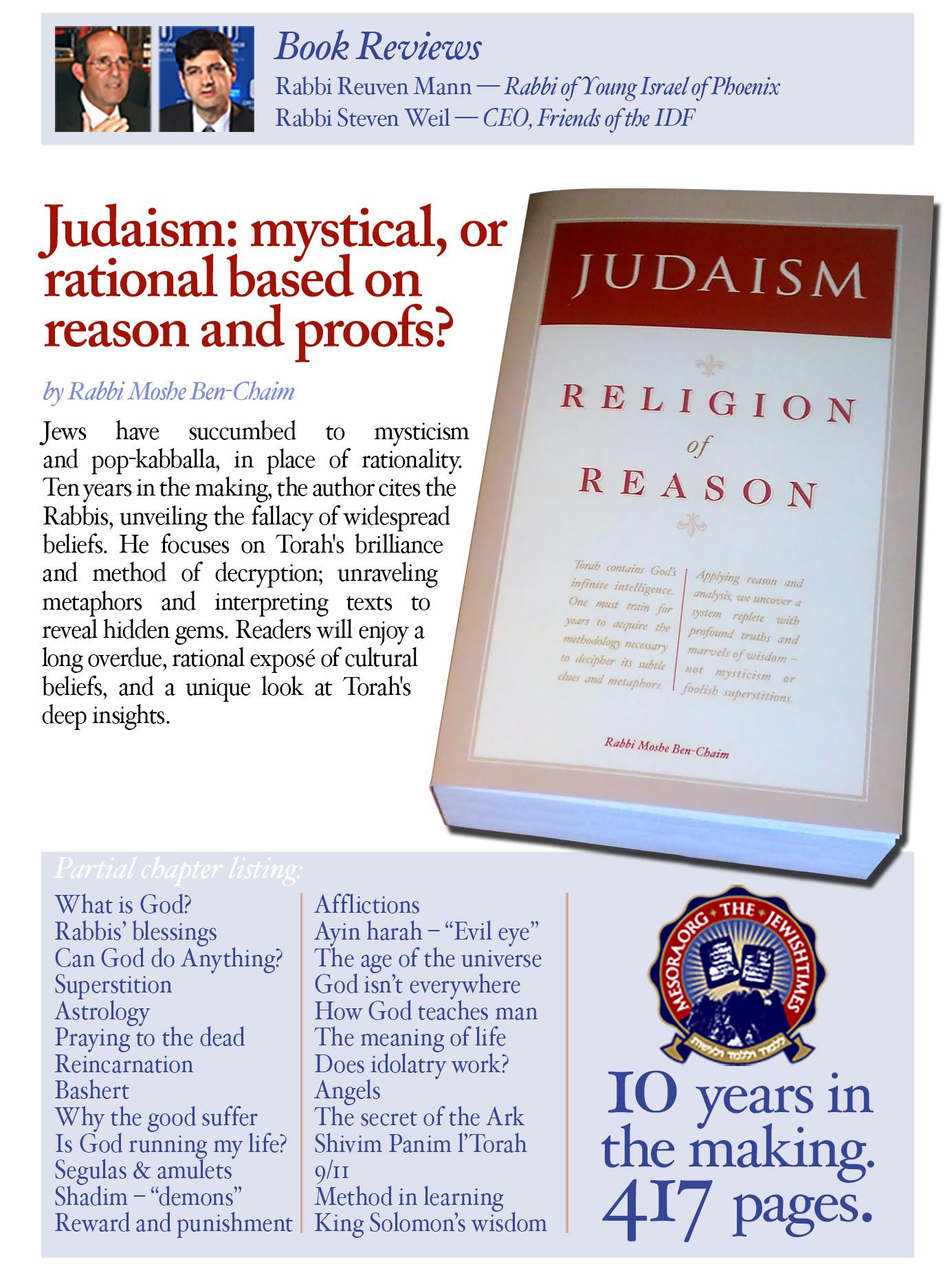


https://spoti.fi/4bMaVa7
In this episode, we sit down with Jessie Fischbein, author of 'Infertility in the Bible: How the Matriarchs Changed Their Fate; How You Can Too.' Jessie’s book stands out for its informal, accessible style and its ability to resonate with readers beyond just Jewish or theistic audiences.
We discuss what inspired her to write it and how readers struggling with infertility have responded. We also dive into her rational approach to prayer, addressing a common struggle—why pray if God is unchanging? Jessie clarifies what prayer truly is and how it di ers from common misconceptions.
Exploring biblical narratives, we examine how emotions played a critical role in fertility, from Leah and Rachel’s sibling rivalry to Hannah’s prayers. Jessie shares insights on the connection between emotions, prayer, and transformation, o ering lessons that couples facing infertility can apply in their own lives.
Finally, we discuss divine intervention and personal agency. Jessie unpacks the Torah’s view on providence and how individuals can actively work on themselves to reshape their path. Don’t miss this thought-provoking conversation!







IS MORE! Embracing the More Authentic Post-Pandemic Reality





NECKONOFF 516-771-9388 AZAMRADJ.COM


